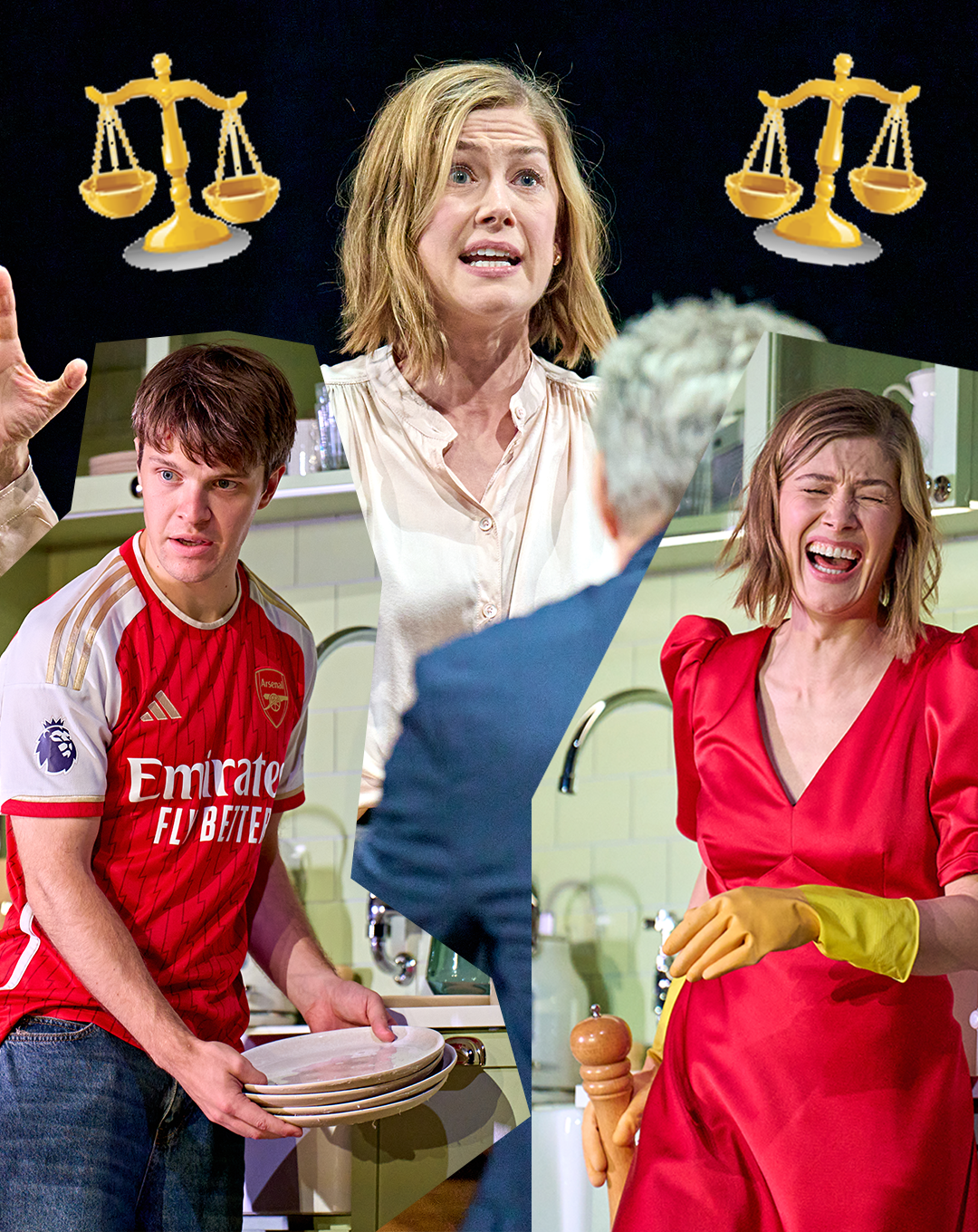Inter Alia Takes On the Manosphere From All Angles
Words: Gina Tonic
Trigger warning: Sexual assault
There have been many attempts at taking audiences behind the scenes of the UK court system, with BBC drama after BBC drama dedicated to showing the judicial system from the points of view of prosecutors, defendants, plaintiffs and solicitors. Writer and previous worker within the legal system, Suzie Miller, takes these conversations to the stage. Where her play, Prima Facie (that sold out cinemas in its run under National Theatre Live last year) humanised the life of a female criminal defence barrister - a job that is often portrayed as immoral due to the clientele - Inter Alia focuses on a more neutral role within the courts: The judge.
Rosamund Pike’s portrayal of Jessica Parks - a feminist member of the bench with a barrister husband and teenage son - is a nuanced juggle of fighting for women’s rights at work while bowing down to patriarchal standards in the family dynamic. Through flashbacks and sneak peeks into Jessica’s home life, this dichotomy is best exemplified through her interactions with her son Harry, played by Jasper Talbot. The extreme testimonies that Jessica regularly listens to in the courtroom eke into her parenting style; overly protective of her son as he experiences playground bullying, puberty and underage parties.
Maintaining a work/life balance is difficult for the best of us, but this contradiction becomes the crux of the play as a now 18-year-old Harry is accused of sexual assault. Without wanting to give much more of the plot away, Jessica’s world unfurls as she tries to balance her protecting her son, believing in her work and needing to know how this could have possibly happened - if she is to believe that it did, possibly, happen.
Throughout her work as a judge, Jessica rallies against “rape myths” and while statistics are never explicitly stated, it feels worth including them in this review to further emphasise the timeliness and importance of Inter Alia. Eight hundred thousand women are sexually assaulted every year in the UK - which is one in thirty women. Ninety four survivors of rape are women and five out of six rapes carried out against women are committed by someone they know. Five in six women who are raped don’t report it to the police and only 1.3 percent of rapes reported to the police in 2021 resulted in a charge that same year.
“In each hand, Inter Alia weighs up sexual assault by its two disparate definitions: Rape as an illegal act that a person can be prosecuted for and rape as an act of violence against another person.”
Jessica, whose character actively participates within these figures and pointedly opposes them in her work, is used expertly as a vehicle to explore the many ways rape culture has evolved in recent years in a pop culture filled with figures like Trump and Andrew Tate, trad wives and internet incel forums cloaked in secrecy. The questions raised by Inter Alia aren’t just brought forward, but even, in some respects, answered by the play.
How does a young man come to commit a crime like this? Is it a lack of education, poor examples of how to treat women from previous generations, or hidden lives online where men are being radicalised by private group chats and sexist social media influencers? Does any of the reasoning matter if in courts around the world, sexual assault cases place the onus of undeniable proof on the victims. Most often women who are suffering from agonising trauma; most often women who knew the perpetrator extremely well.
In each hand, Inter Alia weighs up sexual assault by its two disparate definitions: Rape as an illegal act that a person can be prosecuted for and rape as an act of violence against another person. The National Theatre production, which could easily be named as required watching for parents and young men alike, deserves as many (if not more) accolades as the Netflix phenomenon Adolescence that made waves for exploring the manosphere earlier this year. It is truly a feat in navigating the nuances of the ripple effect that an act of violence causes on the community of the accused as well as the accuser. Held up my phenomenal performances from the small cast, the point of the play can be surmised in one of the first lines that Jessica speaks - where she recognises crying in the court coming from the mother of the convicted in a rape trial - “It’s hard to hear. Another woman suffering the consequences of his actions.”
Inter Alia comes to cinemas from 4 September with National Theatre Live. You can find your local venue at interalia.ntlive.com


